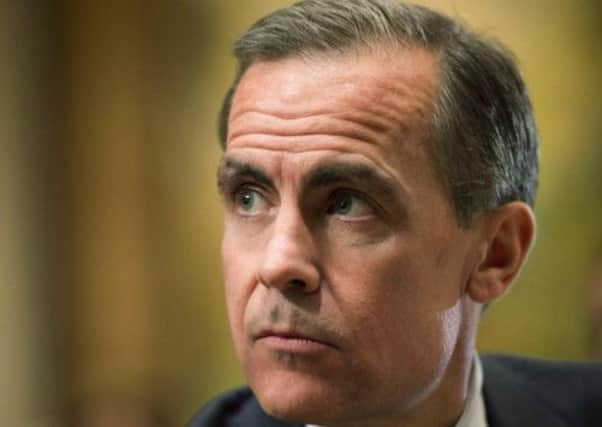The Bank has to do more to revive economy


Chancellor George Osborne is turning to the Bank of England to do more to help revive the country’s stagnant economy.
In his Budget speech, Mr Osborne said the Central Bank’s inflation target would remain at two per cent a year – but that was not enough. “As we’ve seen over the last five years, low and stable inflation is a necessary but not sufficient condition for prosperity,” he told MPs.
Advertisement
Hide AdAdvertisement
Hide AdMr Osborne said he was publishing a review of the Bank’s mandate and said it might need to use “unconventional monetary policy instruments” and give a clearer idea of what it will do in the future. Such instruments in the past have included printing money to buy assets as a way of pumping cash into the economy.
“The new remit explicitly tasks the MPC (Monetary Policy Committee) with setting out clearly the trade-offs it has made in deciding how long it will be before inflation returns to target,” he told MPs.
Such a change might make the Bank operate in a way similar to the US Federal Reserve, which has given signs about how long it will continue to provide support to the US economy. The Bank moves coincide with the arrival in July of a new governor of the Bank, Mark Carney, currently the head of the Bank of Canada.
Mr Carney has previously said he wanted a debate on the role of the Bank.
Advertisement
Hide AdAdvertisement
Hide AdMr Osborne said Mr Carney and the Bank’s current governor, Mervyn King both agreed with the new remit which is set by the Chancellor each year.
A further review of the mandate would be carried out before the end of 2019. In his speech, Mr Osborne also confirmed that the Asset Purchase Facility will remain in place for the coming year. He added: “We are now actively considering with the Bank of England whether there are potential extensions to the successful Funding for Lending Scheme (FLS) that will boost lending still further.”
The FLS was launched in August last year to give financial institutions access to cheap money.
Andrew Palmer, CBI director for Yorkshire and The Humber, said: “The impact of improving the transparency and communication of the Bank’s decisions should help amplify the effectiveness of monetary policy and support the recovery.
Advertisement
Hide AdAdvertisement
Hide Ad“More radical monetary policy options, such as forward guidance, could super-charge this further, although it seems that little is likely to change before Mark Carney takes the wheel.”
However, Howard Archer, the Chief UK and European Economist at IHS Global Insight, said that the adjustment to the Bank of England’s remit “does not make huge changes”.
He added: “In many respects, it prods the Bank of England further in the direction that it had already seemed to be going. The Chancellor has kept the 2.0 per cent consumer price inflation target as the central plank of the Bank of England remit, thereby rejecting, for now at least, alternative suggestions of adopting a 1-3 per cent target range or targeting a nominal GDP growth rate.
“The Chancellor wants the Bank of England to provide guidance over how long monetary policy will stay loose – something that’s been favoured by Mark Carney.”
Advertisement
Hide AdAdvertisement
Hide AdDr Iain Clacher, a lecturer at Leeds University Business School, also said that he didn’t consider the adjustments to the remit to be a radical step, and described the Budget as “broadly neutral”.
British Bankers’ Association chief executive Anthony Browne said: “The new monetary policy framework for the Bank of England will give the Bank greater flexibility to support growth. We have written to the Government to suggest ways to extend the FLS and look forward to further discussion on enhancing this scheme to increase its benefit to British businesses.”
Stuart Cottee, the head of tax for Yorkshire and the north east with Deloitte, said that Mr Osborne was giving the MPC the green light to “think outside the box” and come up with different plans.
Owen Trotter, managing partner of Leeds-based independent private equity house Key Capital Partners, said: “For the longer term, the widening of the Bank of England’s remit to include an explicit focus on growth is encouraging. It will be interesting to see how Mark Carney will choose to exploit this extra room to manoeuvre.”
Advertisement
Hide AdAdvertisement
Hide AdMr Trotter said he expected Mr Carney to take a “more holistic approach” to Bank policy.
In a written response to Mr Osborne’s statement about the remit, Mr King said: “It is in my view, a sensible change to previous remits and contains useful improvements to the framework. Mark Carney and I have discussed the proposed changes and both support the new remit.”
Update ‘not a major change’
Andy Caton, Yorkshire Building Society’s corporate development director, said that the update of the Monetary Policy Committee’s (MPC) remit was not a “fundamental change”.
He added: “The MPC has tolerated above-target inflation for a substantial period, as taking action to slow inflation could have reduced economic growth even further. The Chancellor is simply stating in policy what the MPC has already been doing in practice.”
Phillip Monks, chief executive of Aldermore bank, said he was pleased the Bank and Government were considering extensions to the Funding for Lending Scheme to boost lending further.